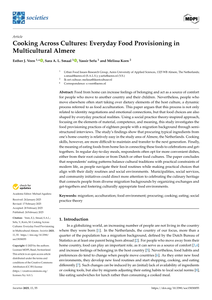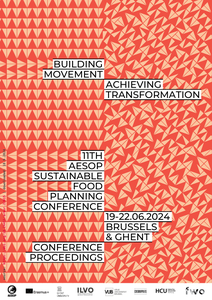Food from home can increase feelings of belonging and act as a source of comfortfor people who move to another country and their children. Nevertheless, people whomove elsewhere often start taking over dietary elements of the host culture, a dynamicprocess referred to as food acculturation. This paper argues that this process is not only related to identity negotiations and emotional connections, but that food choices are also shaped by everyday practical realities. Using a social practice theory-inspired approach, focusing on the elements of material, competence, and meaning, this study investigates the food provisioning practices of eighteen people with a migration background through semistructured interviews.Keywords: migration; acculturation; food environment; procuring; cooking; eating; social practice theory
DOCUMENT

This publication follows and analysis the proces in the region Westerkwartier in the Netherlands in their effort to built a whole new regionale food chain. In this report there is a remarkeble role for the knowledge instutions on vocational and applied level.
DOCUMENT

Moral food lab: Transforming the food system with crowd-sourced ethics
LINK
We explore the role of restaurants and food events in promoting local and regional gastronomy in the Minho region in Northern Portugal. Interviews with restaurant owners and event organizers in this mainly rural region reveal that innovation is driven mainly by changing consumer tastes, but also con-strained by consumer expectations of low prices. Restaurants maintain a family-run structure, also due to a lack of human resources. The main thrust of innovation lies in creating a convivial atmosphere, but there is less emphasis on locally produced food ingredients. In the long run this may undermine the regional food culture and its authenticity, despite the perceived importance of tradition.
MULTIFILE
At the age of a failing economic system and undeniable evidence of the effects humankind has had over the planet, it is necessary to look for alternatives to the way we live locally. This article explores the use of designing narratives and metanarratives to co-create imaginaries serving as the needed alternatives. This research starts by considering the historical factors to understand how industrialisation and the loss of traditional practices created a culture of disconnection from Nature in the Girona area, but also looks at why people start now reconnecting with it. The analysis is the foundation for speculative design practices to co-create a new local narrative of connection and regeneration. The project adopted the Integrative Worldviews Framework and used paradoxes to create possible future worldviews based on historical factors and literature. Citizens participated in conversational future-visioning workshops to develop and evaluate their local imagery of the previously created worldviews. This conversation-based exercise evidenced the potential of paradoxes in destructive futures to create imaginaries of regeneration. These imaginaries merge and form future stories. From the future narratives, the practice created cultural artefacts embodying a new culture of connection based on storytelling, traditional jobs, and a mythological understanding of Nature. Finally, as observed at the end of the project, these artefacts allow citizens to adopt them as their culture and expand their current worldview.
DOCUMENT

Purpose: Food waste occurs in every stage of the supply chain, but the value-added lost to waste is the highest when consumers waste food. The purpose of this paper is to understand the food waste behaviour of consumers to support policies for minimising food waste. Design/methodology/approach: Using the theory of planned behaviour (TPB) as a theoretical lens, the authors design a questionnaire that incorporates contextual factors to explain food waste behaviour. The authors test two models: base (four constructs of TPB) and extended (four constructs of TPB plus six contextual factors). The authors build partial least squares structural equation models to test the hypotheses. Findings: The data confirm significant relationships between food waste and contextual factors such as motives, financial attitudes, planning routines, food surplus, social relationships and Ramadan. Research limitations/implications: The data comes from an agriculturally resource-constrained country: Qatar. Practical implications: Food waste originating from various causes means more food should flow through the supply chains to reach consumers’ homes. Contextual factors identified in this work increase the explanatory power of the base model by 75 per cent. Social implications: Changing eating habits during certain periods of the year and food surplus have a strong impact on food waste behaviour. Originality/value: A country is considered to be food secure if it can provide its citizens with stable access to sufficient, safe and nutritious food. The findings and conclusions inform and impact upon the development of food waste and food security policies.
MULTIFILE
This study theorizes on the sociomateriality of food in authority-building processes of partial organizations by exploring alternative food networks (AFNs). Through the construction of arenas for food provisioning, AFNs represent grassroots collectives that deliberately differentiate their practices from mainstream forms of food provisioning. Based on a sequential mixed-methods analysis of 24 AFNs, where an inductive chronological analysis is followed by a qualitative comparative analysis (QCA), we found that the entanglements between participants’ food provisioning practices and food itself shape how authority emerges in AFNs. Food generates biological, physiological and social struggles for AFN participants who, in turn, respond by embracing or avoiding them. As an outcome, most AFNs tend to bureaucratize over time according to four identified patterns while a few idiosyncratically build a more shared basis of authority. We conclude that the sociomateriality of food plays an important yet indirect role in understanding why and how food provisioning arenas re-organize and forge their forms of authority over time. Pascucci, S., Dentoni, D., Clements, J., Poldner, K., & Gartner, W. B. (2021). Forging Forms of Authority through the Sociomateriality of Food in Partial Organizations. Organization Studies, 42(2), 301-326. https://doi.org/10.1177/0170840620980232
DOCUMENT

Citizens living in food poverty can easily get caught up in a vicious cycle. Socio-economically disadvantaged people often rely on food assistance and are more likely to suffer from diseases caused by unhealthy diets, such as diabetes. They may also experience isolation and lack social networks, as they do not have the financial means to participate in social life. Moreover, this group is often overlooked in decision-making processes regarding healthy and sustainable food environments. To create equitable food environments in urban areas, it is crucial to incorporate the everyday challenges and needs of socioeconomically disadvantaged people. In our collaborative research, we explore the needs of socioeconomically disadvantaged people regarding a healthy and sustainable diet in Switzerland and the Netherlands. The aim is also to develop, in a participatory way, ideas on how to create more socially just and inclusive food environments.Keywords: food poverty, food environments, social participation, participatory action research
DOCUMENT

The transition towards a sustainable and healthy food system is one of the major sustainability challenges of today, next to the energy transition and the transition from a linear to circular economy. This paper provides a timely and evidence-based contribution to better understand the complex processes of institutional change and transformative social-ecological innovation that takes place in the food transition, through a case study of an open innovation and food transition network in The Netherlands, the South-Holland Food Family (Zuid-Hollandse Voedselfamilie). This network is supported by the provincial government and many partners, with the ambition to realize more sustainable agricultural and food chains, offering healthy, sustainable and affordable food for everyone in the Province of South-Holland in five to ten years from now. This ambition cannot be achieved through optimising the current food system. A transition is needed – a fundamental change of the food system’s structure, culture and practice. The Province has adopted a transition approach in its 2016 Innovation Agenda for Sustainable Agriculture. This paper provides an institutional analysis of how the transition approach has been established and developed in practice. Our main research question is what interventions and actions have shaped the transition approach and how does the dynamic interplay between actors and institutional structures influence institutional change, by analysing a series of closely related action situations and their context, looking at 'structure' and 'agency', and at the output-outcomes-impact of these action situations. For this purpose, we use the Transformative Social-Ecological Innovation (TSEI)-framework to study the dynamic interplay between actors and institutional structures influencing institutional change. The example of TSEI-framework application in this paper shows when and how local agents change the institutional context itself, which provides relevant insights on institutional work and the mutually constitutive nature of structure and agency. Above institutional analysis also shows the pivotal role of a number of actors, such as network facilitators and provincial minister, and their capability and skills to combine formal and informal institutional environments and logics and mobilize resources, thereby legitimizing and supporting the change effort. The results are indicative of the importance of institutional structures as both facilitating (i.e., the province’s policies) and limiting (e.g. land ownership) transition dynamics.
DOCUMENT

PurposeFood waste is one of the most challenging issues humanity is currently facing. Therefore, there has been a growing interest in the prevention of food waste because of world hunger, environmental impacts, resource scarcity and economic costs. The purpose of the study is to investigate the factors that influence food waste and the role of technology in tackling food waste in India and the Netherlands.Design/methodology/approachIn order to explore differences in food loss and waste further this study will examine a number of practices on both the production and the consumer side, in a developing country and a developed country with different culture/economic backgrounds: India and the Netherlands. The factors that influence food waste were examined with a preliminary qualitative study, which consists of semi-structured interviews, and quantitative research that comprises a survey. Semi-structured interviews were conducted in both India and the Netherlands, which consists of five interviews. The survey data was collected from 78 individuals from India and 115 individuals from the Netherlands.FindingsOne of the main findings of the research is food waste is divided into waste within agricultural production (i.e. food loss) and final household consumption (i.e. food waste). Different factors influence food loss in different stages in the supply chain. Some of these factors include wastage during processing, storage, transportation and at the market-place. New technologies can utilize food loss for new purposes, so food loss is reduced to the minimum. Food waste is mainly influenced by food passing expiry date, food that is left too long in the fridge and consumers buying too much food. In final household consumption, technologies such as digital platforms enable individuals or organizations to share and donate their food, thereby creating awareness on food waste prevention and the environmental and ethical benefits.Originality/valueThe authors examine to what extent and in which ways supporting consumers to minimize food waste can be achieved via three stages: (1) understanding and evaluating food loss and waste, (2) identifying the factors that influence food loss and waste, (3) understanding consumer behaviors to encourage food waste reduction and (4) identifying the technological impact that would reduce food waste. As such, this paper contributes to ongoing debates about food waste by looking at the role of context and culture and by exploring differences between developed and developing countries. Also, the authors advance the debate by exploring both the role of advanced technology such as blockchain and drones in both preventing loss and waste as well as non-technological mechanisms.
DOCUMENT